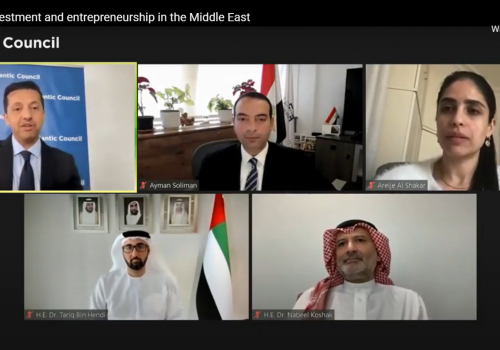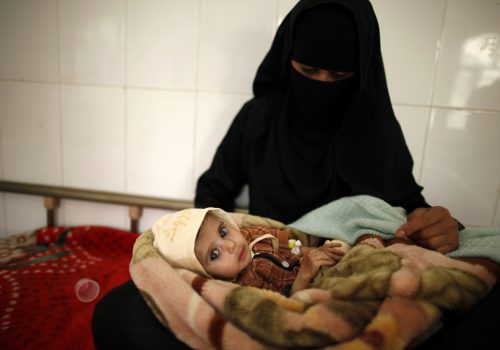Ensuring the UAE’s food security in an unstable region
In an era of increasing geopolitical instability, the United Arab Emirates (UAE) faces a critical challenge: ensuring food security for its growing population and residents, currently at around 10 million. As a nation that imports more than 90 percent of its food, the UAE’s vulnerability to global supply-chain disruptions has never been more apparent. Recent events—from the Ukraine conflict to tensions in the Middle East—have exposed the fragility of the global food system. To safeguard its future, the UAE must urgently recalibrate its food security strategy, building upon the foundations laid by the UAE Food Security Policy of 2018 and the National Food Security Strategy 2051, while adapting to rapidly evolving global challenges.
The 2018 UAE Food Security Policy set the initial framework for addressing food security challenges. This was followed by the more comprehensive National Food Security Strategy 2051, officially launched in 2019. These initiatives collectively aim to achieve food security for the UAE, ensuring sustainability of food and access to it.
A key aspect of the UAE’s approach to food security has been the strategic involvement of the private sector. Companies like Al Dahra, a prominent Abu Dhabi-based agribusiness, have played a crucial role in implementing the nation’s food security policy. Al Dahra’s expansive operations, spanning five continents, have significantly contributed to the UAE’s efforts to secure its food supply chain. The company’s investments in agricultural land abroad—and its focus on essential commodities like rice, flour, and animal feed—align closely with the UAE’s strategy to diversify its food sources and reduce import dependency. Another notable private-sector contributor is Elite Agro, a leading Emirati producer, which has been instrumental in increasing the domestic production of fruits and vegetables. The adoption of advanced farming techniques, including hydroponics and vertical farming, directly supports the UAE’s goal of enhancing local food production using innovative technologies.
SIGN UP FOR THIS WEEK IN THE MIDEAST NEWSLETTER
However, the UAE’s reliance on food imports remains a significant challenge. In 2022, the country imported approximately 16.9 million tons of food, with cereals forming a significant portion. Wheat, a crucial staple, saw imports of around 1.9 million tons in 2022, primarily sourced from Russia (31 percent), Canada (28 percent), and Australia (12 percent) and recently India (41 percent). Rice imports, totaling about 1.2 million tons, came mainly from India (53 percent), Pakistan (31 percent), and Thailand (8 percent).
To address this import dependency, the UAE’s food security policy emphasizes diversifying import sources and developing strategic food reserves. The country has been actively working to strengthen its position as a global food trading hub, leveraging its advanced logistics infrastructure and strategic location. Private-sector companies have been key partners in this effort, with firms like DP World playing a crucial role in enhancing the UAE’s food logistics capabilities.
The 2022 Russian invasion of Ukraine highlighted the importance of these policy measures. As Russia and Ukraine together account for about 30 percent of global wheat exports and 19 percent of corn exports, the conflict sent wheat prices soaring by nearly 60 percent in early 2022. This crisis underscored the urgency of the UAE’s efforts to diversify its food import sources and enhance strategic stockpiles. Even though prices have stabilized since then, the crisis has highlighted the criticality of ensuring stable food supplies.
In response to such global disruptions, the UAE accelerated its efforts to increase domestic food production even before the Ukraine war began. In 2021, the country’s Agriculture Innovation Mission for Climate (AIM for Climate), launched in partnership with the United States, exemplifies its commitment to developing climate-smart agriculture and food systems. This initiative aligns with Strategy 2051 and the current policy’s focus on sustainable, technology-driven agriculture.
Vertical farming has shown promising results in the Emirati climate, aligning with the policy’s emphasis on water-efficient agriculture. The world’s largest vertical farm, opened in Dubai in 2022 by Emirates Flight Catering in partnership with US-based Crop One, can produce more than one thousand tons of leafy greens annually. The farm uses 95 percent less water than traditional farming, making it ideal for the country’s desert conditions. Such initiatives directly contribute to the UAE’s goal of increasing its domestic food production capacity and demonstrate the vital role of public-private partnerships in achieving food security objectives.
Maritime security is also crucial for successfully implementing the UAE’s food security policy. The Bab el-Mandeb Strait, which connects the Red Sea to the Gulf of Aden, is vital for the UAE’s food security, as about 70 percent of the UAE’s food imports transit through it. Recent attacks on commercial vessels in the Red Sea highlight the vulnerability of these critical supply lines. In response, the UAE has been actively involved in multinational efforts to secure these vital shipping routes, demonstrating its commitment to protecting its food supply chains.
Additionally, forming a coalition with neighboring countries to create a regional food security alliance can significantly enhance resilience. This alliance would facilitate resource sharing, joint investments in food production infrastructure, and coordinated responses to food supply disruptions. By establishing shared strategic reserves and collaborative research initiatives, the alliance would optimize regional resources, such as shared water management and agricultural expertise, enhancing overall food production capacity. A united regional front can better withstand and respond to global food supply shocks, ensuring stability and security. Strengthening regional ties through economic and food security cooperation can enhance political stability and reduce tensions, positioning the countries of the region as leaders in proactive food security strategies.
As the world grapples with increasingly complex geopolitical challenges, the UAE’s approach to food security continues to evolve. Going forward, it should accelerate the implementation of the National Food Security Strategy 2051, coupled with adaptive policy measures to address emerging threats and strong private-sector engagement, the UAE is positioning itself as a leader in food security in the region and beyond.
Hadi Fathallah is a senior agriculture specialist with the World Bank. The findings, interpretations, and conclusions expressed in this article are entirely those of the author and should not be attributed in any manner to the World Bank, its affiliated organizations, members of its board of executive directors, or the countries they represent. Follow him on X: @Hadi_FAO.
Further reading
Fri, Aug 11, 2023
AlDhabi AlMheiri: Meet the nine-year-old driving change in the UAE, one book at a time
MENASource By Holly Dagres
AlDhabi AlMheiri is the youngest Emirati entrepreneur and youngest publisher. The nine-year-old was interviewed by our MENASource editor about her remarkable entrepreneurial journey and achievements.
Thu, Mar 25, 2021
‘It’s not a zero-sum game’: MENA officials agree that regional integration is key to growth
MENASource By
Atlantic Council’s empowerME initiative and the King Faisal Center for Research and Islamic Studies co-hosted an event that discussed strategies for building regional cooperation to create a more attractive investment landscape and productive entrepreneurial ecosystem. These are some key takeaways.
Wed, Oct 16, 2019
Winning the humanitarian war in Yemen
MENASource By
While Saudi Arabia came into Yemen very sensitive of the regional Iranian challenge and Houthi threat, its war strategy and foreign policy lacks any awareness of the looming and ongoing environmental and humanitarian war that will affect the overall outcome of the peace in Yemen.
Image: A worker walks next to leafy vegetables grown at the vertical nutrient film technique (NFT) system at Veggietech, a start-up farm, that produces all year-round crops using smart and sustainable farming technologies in the middle of UAE's Sharjah desert, in Sharjah, United Arab Emirates, February 1, 2023. REUTERS/Rula Rouhana


